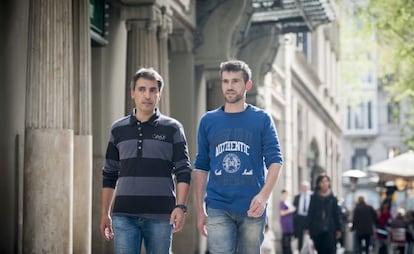From the Dakar Rally to a French jail
Catalan drivers held for five weeks after police discover 1.4 tons of cocaine hidden in their vehicle Bulgarian criminals suspected of organizing smuggling operation


After spending five weeks in a French prison on drug trafficking charges, Xavi Mora and Jordi Bañeres, who both own car repair workshops in Barcelona, have been released without charges, and returned to Spain.
Their nightmare began on February 20, when the truck they had been hired to drive by the Epsilon team taking part in the Dakar Rally was searched by French police, who had been given a tip-off. Stashed inside several tires was 1.4 tons of cocaine, worth an estimated 270 million euros.
The two friends had left the truck in an official car park in the Chilean port city of Valparaiso on January 18 at the end of the rally and handed the keys to Dakar staff. Five days later, the vehicle was loaded aboard a ship, which then transported it to France. Meanwhile, Mora and Bañeres flew back home. A month later they were informed that the vehicle had arrived in France, and, along with seven others from the Epsilon team, they drove up to Le Havre from Barcelona to collect the truck.
Stashed inside several tires was 1.4 tons of cocaine, worth an estimated 270 million euros
Along with Mora and Bañeres, the owner of the Epsilon team, David Oliveras, was arrested at his home in Barcelona. Police also detained two Bulgarians, who are now thought to have been behind the smuggling operation. Oliveras has not been charged, but has remained in custody while the investigation continues.
Mora, Bañares and the others had already covered 450 kilometers of the trip back to Spain when armed French police stopped them at a service station. “We were just about to get back in the vehicles when around 10 armed guys appeared from nowhere. I thought we were being robbed. When they put the handcuffs on I was relieved, thinking that this was a misunderstanding. They only said one word in Spanish: ‘Drogas.’ They put us in cars and took us to Nanterre, which is the center of their anti-drugs operations.”
The French police kept the men in separate, windowless cells, which were lit at all times for a month. They were kept incommunicado, despite a court order permitting visits and calls. They were repeatedly interrogated, but Mora and Bañera’s stories were the same. Finally, after four days, a French court ordered them to be held provisionally in Lille prison.
The French police kept the men in separate, windowless cells, which were lit at all times for a month
The majority of the prison’s inmates are serving sentences for drug trafficking. “The place was incredibly noisy, it was like some crazy fiesta was going on the whole time,” says Bañera. He says he slept little and was constantly in fear for his life. They were kept in separate, overcrowded cells, where they slept on mattresses on the floor. “One of the guys ended up being my best friend,” says Mora. “He was scary, but he protected me from another prisoner, who was very violent,” “We only saw each other a couple of times, once from the exercise yard, and another through the barred windows: we were like Romeo and Juliet,” jokes Bañera.
Eventually, after three weeks, they were allowed to share a cell. They had stopped going out to the exercise yard. “There were these terrible fights and no guards around,” they explain. So they remained in their cells with nothing to do but wait.
Denied any contact with the outside world, it came as a surprise when, five weeks into their confinement, they were told via the intercom in their cell that they could leave. They were picked up by their lawyer and taken to a hotel in Paris. “The only thing we wanted to do was take a shower. We didn’t sleep; we just spent the night walking around. At 4am we found ourselves standing in front of Notre Dame.” The next day they took a train to Barcelona, returning to their respective villages, where weekly vigils had taken place calling on the French authorities to speed up the investigation.
Both men say that they believe Oliveras is innocent, and that they have no idea who might have been responsible for hiding the drugs in their truck. Despite their experience, they insist that they will be returning to next year’s Dakar Rally.
Tu suscripción se está usando en otro dispositivo
¿Quieres añadir otro usuario a tu suscripción?
Si continúas leyendo en este dispositivo, no se podrá leer en el otro.
FlechaTu suscripción se está usando en otro dispositivo y solo puedes acceder a EL PAÍS desde un dispositivo a la vez.
Si quieres compartir tu cuenta, cambia tu suscripción a la modalidad Premium, así podrás añadir otro usuario. Cada uno accederá con su propia cuenta de email, lo que os permitirá personalizar vuestra experiencia en EL PAÍS.
¿Tienes una suscripción de empresa? Accede aquí para contratar más cuentas.
En el caso de no saber quién está usando tu cuenta, te recomendamos cambiar tu contraseña aquí.
Si decides continuar compartiendo tu cuenta, este mensaje se mostrará en tu dispositivo y en el de la otra persona que está usando tu cuenta de forma indefinida, afectando a tu experiencia de lectura. Puedes consultar aquí los términos y condiciones de la suscripción digital.








































